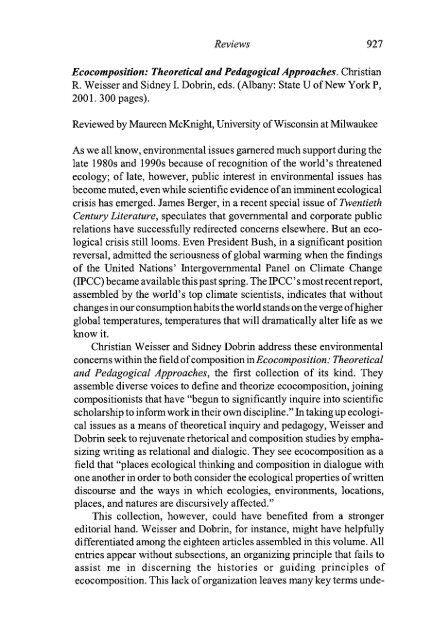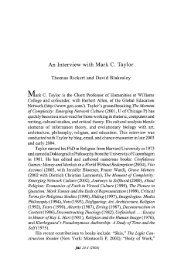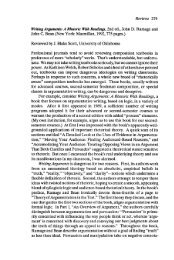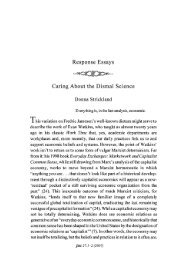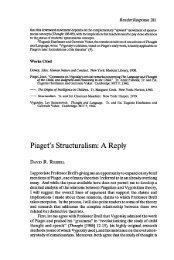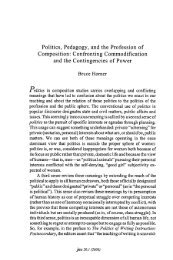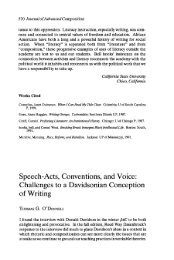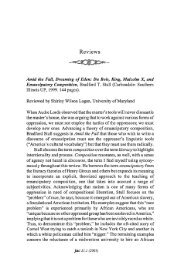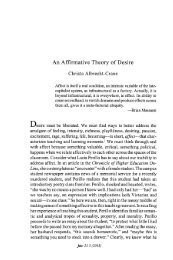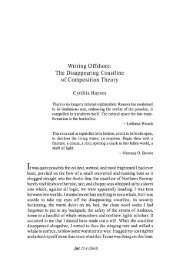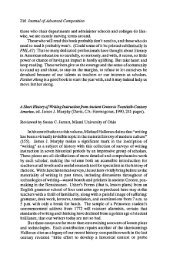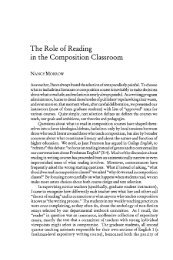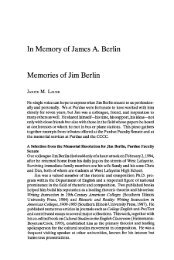Ecocomposition: Theoretical and Pedagogical ... - JAC Online
Ecocomposition: Theoretical and Pedagogical ... - JAC Online
Ecocomposition: Theoretical and Pedagogical ... - JAC Online
You also want an ePaper? Increase the reach of your titles
YUMPU automatically turns print PDFs into web optimized ePapers that Google loves.
Reviews 927<br />
<strong>Ecocomposition</strong>: <strong>Theoretical</strong> <strong>and</strong> <strong>Pedagogical</strong> Approaches. Christian<br />
R. Weisser <strong>and</strong> Sidney I. Dobrin, eds. (Albany: State U of New YorkP,<br />
2001.300 pages).<br />
Reviewed by Maureen McKnight, University of Wisconsin at Milwaukee<br />
As we all know, environmental issues garnered much support during the<br />
late 1980s <strong>and</strong> 1990s because of recognition of the world's threatened<br />
ecology; of late, however, public interest in environmental issues has<br />
become muted, even while scientific evidence of an imminent ecological<br />
crisis has emerged. James Berger, in a recent special issue of Twentieth<br />
Century Literature, speculates that governmental <strong>and</strong> corporate public<br />
relations have successfully redirected concerns elsewhere. But an ecological<br />
crisis still looms. Even President Bush, in a significant position<br />
reversal, admitted the seriousness of global warming when the findings<br />
of the United Nations' Intergovernmental Panel on Climate Change<br />
(IPCC) became available this past spring. The IPCe's most recent report,<br />
assembled by the world's top climate scientists, indicates that without<br />
changes in our consumption habits the world st<strong>and</strong>s on the verge ofhigher<br />
global temperatures, temperatures that will dramatically alter life as we<br />
know it.<br />
Christian Weisser <strong>and</strong> Sidney Dobrin address these environmental<br />
concerns within the field of composition in <strong>Ecocomposition</strong>: <strong>Theoretical</strong><br />
<strong>and</strong> <strong>Pedagogical</strong> Approaches, the first collection of its kind. They<br />
assemble diverse voices to define <strong>and</strong> theorize ecocomposition,joining<br />
compositionists that have "begun to significantly inquire into scientific<br />
scholarship to inform work in their own discipline." In taking up ecological<br />
issues as a means of theoretical inquiry <strong>and</strong> pedagogy, Weisser <strong>and</strong><br />
Dobrin seek to rejuvenate rhetorical <strong>and</strong> composition studies by emphasizing<br />
writing as relational <strong>and</strong> dialogic. They see ecocomposition as a<br />
field that "places ecological thinking <strong>and</strong> composition in dialogue with<br />
one another in order to both consider the ecological properties ofwritten<br />
discourse <strong>and</strong> the ways in which ecologies, environments, locations,<br />
places, <strong>and</strong> natures are discursively affected."<br />
This collection, however, could have benefited from a stronger<br />
editorial h<strong>and</strong>. Weisser <strong>and</strong> Dobrin, for instance, might have helpfully<br />
differentiated among the eighteen articles assembled in this volume. All<br />
entries appear without subsections, an organizing principle that fails to<br />
assist me in discerning the histories or guiding principles of<br />
ecocomposition. This lack of organization leaves many key terms unde-
928 jac<br />
fined, including the ones Weisser <strong>and</strong> Dobrin mention above. They resist<br />
carefully defining ecocomposition in the introduction, except to say that<br />
it is "about relationships," preferring instead to state that the collection<br />
contains a diversity of approaches to "underst<strong>and</strong>ing <strong>and</strong> practicing"<br />
ecocomposition. Hence, they neither chart cohesively the exigencies of<br />
ecocomposition nor detail the relationships among ecocomposition, its<br />
use, <strong>and</strong> its potential value for the field of rhetoric <strong>and</strong> composition.<br />
Subsections might have assisted the editors to explicate the key terms <strong>and</strong><br />
ideologies at stake in the field, thus helping them to make stronger<br />
interventions into both composition <strong>and</strong> ecocritical theories. Greta Gaard' s,<br />
R<strong>and</strong>all Roorda's, <strong>and</strong> Weisser's contributions, for example, all provide<br />
histories <strong>and</strong> might have been assembled together under one heading. As<br />
it is, <strong>Ecocomposition</strong> speaks to a narrowly conceived audience already<br />
familiar with ecocriticism.<br />
Given this implied audience, I see at least four operative principles in<br />
<strong>Ecocomposition</strong> that indicate (1) sources of strength for a curriculum that<br />
combines ecological principles with composition theory, <strong>and</strong> (2) areas<br />
where future growth must occur for ecocomposition to thrive.<br />
First, several contributors to the collection presume that teaching<br />
ecocomposition equates to a moral responsibility. Given that we st<strong>and</strong> on<br />
an environmental threshold, this kind of morality is underst<strong>and</strong>able;<br />
however, it often <strong>and</strong> problematically goes unchallenged. Colleen<br />
Connolly, for instance, proposes an ecocomposition pedagogy that "aims<br />
to examine <strong>and</strong> think about the discursive <strong>and</strong> cultural practices that<br />
define the relations among individuals, society, <strong>and</strong> nature-providing<br />
students with opportunities to write environmentally conscious essays<br />
that locate a diverse humanness within an extended community of other<br />
life forces <strong>and</strong> ecologies." The ethic that emerges from her work involves<br />
"a sense that each item in a web of connections is necessary for the<br />
viability of experience." Derek Owens advocates creating a composition<br />
curriculum-<strong>and</strong> curricula in general-that emphasizes sustainability<br />
<strong>and</strong> that "moves continually toward environmental stability <strong>and</strong> community<br />
revitalization." In response, we might ask, why is the need to teach<br />
environmentalism the moral responsibility of composition teachers?<br />
What is the implied purpose of composition in this presumption? Do<br />
composition teachers need an environmental ethic to legitimate their<br />
practices?<br />
David Sumner, in contrast, challenges this assumption of moral<br />
responsibility. In editing a collection of syllabi for the Association for the<br />
Study of Literature <strong>and</strong> the Environment (ASLE), Sumner recognized the
Reviews 929<br />
prevalence of environmentalism <strong>and</strong> the diminution of composition<br />
theory in all but one of the ecocomposition courses. As a result, Sumner<br />
argues, "we first need to discuss, argue about, <strong>and</strong> explore what we mean<br />
when we use the term composition." He advocates an approach to<br />
ecocomposition theory <strong>and</strong> pedagogy that emphasizes argumentation.<br />
This approach, he says, prevents us from advocating any particular<br />
environmental ideology. He speculates that, while we would most likely<br />
feel no qualms about teaching an ecocomposition course, we might feel<br />
considerable discomfort in teaching a Christian, Buddhist, or Muslim<br />
composition course. He importantly asks, "How can we justify teaching<br />
a composition [course] that highlights our environmental commitments<br />
<strong>and</strong> feel that [another ideology] is less legitimate?" Sumner discerns what<br />
other contributors to this text do not: that environmentalism often<br />
functions as the primary subject of ecocomposition classes-at the<br />
expense of writing theory. Sumner thus registers his commitment to<br />
environmentalism below his commitment to argument. In so doing, he<br />
confronts two of the most problematic assumptions of ecocriticism in<br />
general: the unquestioned endorsement of environmentalism as a moral<br />
responsibility <strong>and</strong> the reliance on an essentialized concept of nature.<br />
Gaard also avoids essentializing nature <strong>and</strong> does not rely on an<br />
unproblematized morality as the reason composition should engage with<br />
environmentalism. She details the intersections among composition<br />
theory, ecocriticism, <strong>and</strong> ecofeminism to chart how one might realize "a<br />
healthy diversity of environmentalisms in the classroom." Gaard uses a<br />
liberatorypedagogy that allows her "to' teach' environmental ethics as an<br />
adjunct to teaching writing." In the composition classroom, Gaard<br />
subordinates environmental morality to the pedagogy of writing. She<br />
does not ab<strong>and</strong>on environmentalism; instead, she encourages her students<br />
to develop their own relationships to nature <strong>and</strong> its protection. She<br />
says that ecocomposition offered her "a tangible means for sharing<br />
authority" <strong>and</strong> beliefs in the area of environmental ethics in a way that is<br />
not always possible when she teaches other subjects because of students'<br />
perceptions of her as "an invested player." Gaard provides an effective<br />
template for how we might use environmentalism in conjunction with,<br />
<strong>and</strong> not instead of, composition studies.<br />
A second implied principle that guides this collection is essentialism.<br />
Unlike Sumner <strong>and</strong> Gaard, many contributors rely on an ahistorical <strong>and</strong><br />
essentialized concept of nature. An ethical approach combined with<br />
astute critical inquiry, as I have noted in Sumner <strong>and</strong> Gaard, defines <strong>and</strong><br />
theorizes more thoroughly the goals <strong>and</strong> strategies of the new field. An
930 jac<br />
uncritical definition of nature, however, though common in ecocriticism,<br />
leads to overstatements regarding nature's authority. For instance, Stephen<br />
Brown agues in "The Wilderness Strikes Back: Decolonizing the Imperial<br />
Sign in the Borderl<strong>and</strong>s" that a "native" or "indigenous" Alaska<br />
resists colonialist appropriation. I see this invocation of an essentialized<br />
nature as a retreat from, not a move toward, an underst<strong>and</strong>ing of relational<br />
discourse <strong>and</strong> its effects. In analyzing how "signification functions as a<br />
vehicle of cultural domination," Brown romanticizes the Alaskan wilderness<br />
by saying it "transcends signification insofar as it refuses differentiation."<br />
He also simplifies, rather troublingly, those "native people<br />
whose identity since the mists of time has been undifferentiated from the<br />
l<strong>and</strong>." This assumption of nature's <strong>and</strong> indigenous people's stable identities<br />
problematically simplifies the construction or performance of<br />
meaning. A critical definition of nature not as transcendent but as socially<br />
constructed need not impede ecocritical thinking, as we find in Mark<br />
Long's contribution.<br />
This essentializing ofnature emerges from a third operative principle<br />
in many of <strong>Ecocomposition</strong>'s essays: a resistance to poststructuralism.<br />
Not all contributors refute anti-foundational theory, but Paul Lindholdt,<br />
for instance, says that theory "demeans good writing" by "carrying those<br />
theoretical dimensions far beyond a healthy balance, <strong>and</strong> thereby diminishing<br />
the honest promises of succinct communication." He instead<br />
advocates an "applied composition," resulting from "place-based or<br />
bioregional study" that, he says, offers consequentiality to composition<br />
studies. Additionally, this anti-theoretical underst<strong>and</strong>ing ofnature exists<br />
simultaneously with a regressive form of nostalgia. Lindholdt, for example,<br />
laments the passing of a humanist belief in "nature as a site of<br />
inspiration <strong>and</strong> wonder, a route to the truth." Edward Lotto also mourns<br />
for "the old solid ground we used to share." He feels that the "postmodem<br />
world seems to delight in pulling the rug out from under us, in calling into<br />
question any ground we might try to st<strong>and</strong> on." But Lotto, unlike<br />
Lindholdt, works within the seeming contradiction of an essentialized<br />
<strong>and</strong> a socially constructed nature to assert that nature operates as a "sort<br />
of nonfoundational authority." Nature is not simply "out there," offering<br />
"some sort of solace or power of regeneration." Lotto's goals in his<br />
writing classes, then, reflect how we are "shaped by cultural forces."<br />
Annie Merrill Ingram perhaps most directly speaks to the dual effects<br />
of ecocomposition, calling it "as much an ideological practice as a<br />
pedagogical one." She argues that an "interdisciplinary curriculum<br />
linked to extradisciplinary service opportunities" gives students not only
Reviews 931<br />
"a firm knowledge <strong>and</strong> skills base in environmental issues" but also "the<br />
trust <strong>and</strong> interactive skills that enable them to succeed in composition<br />
activities." Though this approach may seem to assert only an environmental<br />
ideology, Ingram's argument for sustainability emerges from "clear<br />
<strong>and</strong> effective communication" requiring "a sensitivity to audience <strong>and</strong><br />
environment, an awareness of immediate purpose <strong>and</strong> long-range consequences,<br />
the ability to identify problems <strong>and</strong> propose solutions, <strong>and</strong> the<br />
commitment to include <strong>and</strong> inspire others." She theorizes ecocomposition<br />
to address environmental concerns <strong>and</strong> process theory, context, <strong>and</strong><br />
audience.<br />
As theoretically strong as some of these entries are, however,<br />
ecocomposition will not grow until critics address the presumptive white,<br />
affluent audience of ecocriticism; this issue constitutes the fourth operative<br />
principle in <strong>Ecocomposition</strong>. Many authors in this collection do not<br />
directly consider how race <strong>and</strong> class affect our conceptions of <strong>and</strong><br />
relations with nature. Christopher Keller <strong>and</strong> Julie Drew both examine<br />
the work of place in ecocomposition, with Keller, for example, discovering<br />
through his students that African Americans approach, define, <strong>and</strong><br />
experience nature differently. While his approach takes up some<br />
multicultural concerns, such concerns do not constitute his focus. He asks<br />
his students to compose their own narratives of retreat to consider<br />
"ecologically useful ways to think about voice." He questions his white<br />
<strong>and</strong> black students' relation to nature, but he assumes the stability of<br />
nature <strong>and</strong> race as signifiers. His chapter is the only one engaged with<br />
multiculturalism in this collection, though several contributors select<br />
multicultural authors to teach in their composition courses. As Keller<br />
says, both his black <strong>and</strong> white students imagined environmental<br />
audiences as white readers. This insight marks a place where much<br />
room for growth in ecocriticism in general <strong>and</strong> ecocomposition in<br />
particular exists.<br />
Taken as a whole, this collection, though smart <strong>and</strong> incisive in many<br />
essays, suffers from a lack of editorial guidance <strong>and</strong> the problems of<br />
ecocriticism in general. Weisser <strong>and</strong> Dobrin appear to underst<strong>and</strong> these<br />
shortcomings, saying in their introduction that they find it "essential that<br />
any of us working in ecocomposition studies ... be willing to problematize<br />
<strong>and</strong> self-reflexively critique these initial explorations into<br />
ecocomposition." Even their SUNY Press reviewer says, as the editors<br />
report in their introduction, that this new field "must be willing to<br />
consider 'counter-hegemonic' arguments." In a way, Dobrin anticipates<br />
my reaction to his collection when he insists in his own article that
932 jae<br />
ecocomposition "must move beyond its stereotyped role of just addressing<br />
'environmentalist' concerns ... to examining concepts of environment,<br />
location, space, <strong>and</strong> place as encompassing all of the spaces we<br />
inhabit."<br />
Why, then, does Dobrin think ecocomposition, given its insular<br />
tendencies, is worth enacting? Perhaps because, unlike ecocriticismwhich,<br />
Dobrin says, seeks "to establish place as simply a critical category"-ecocomposition<br />
engages "place as rhetoric." Composition,<br />
Dobrin argues, "is the activity of creating <strong>and</strong> reacting to environments,<br />
<strong>and</strong> rhetorics are those environments." Dobrin argues that both our<br />
relationships to nature <strong>and</strong> our conceptions of nature itself must be<br />
examined carefully. His framing of the collection with Weisser,<br />
however, <strong>and</strong> their presentation of material do not build on these<br />
insights.<br />
Like Dobrin, Weisser complicates our underst<strong>and</strong>ing of identity,<br />
mapping the "various theoretical <strong>and</strong> pedagogical discussions in contemporary<br />
composition studies" since they have "as one of their primary<br />
underlying goals the cultivation of a more complex <strong>and</strong> sophisticated<br />
awareness of how student writers form their own conceptions of identity."<br />
He argues that through ecological perspectives "we might enable<br />
our students to more fully underst<strong>and</strong> their own relationships with<br />
others." Students "may emerge with a greater awareness of their places<br />
in the world." Dobrin <strong>and</strong> Weisser both consider place as relational,<br />
finding ecocomposition's power in its destabilization of meaning. This<br />
approach seems to have been their collection's goal, but, while some<br />
contributors think carefully about environmentalism <strong>and</strong> its pedagogical<br />
ramifications, others markedly veer from that path.<br />
This alternate response develops, in part, from a lack of enthusiasm<br />
for teaching writingeEnvironmentalism seems to remedy this prob lem for<br />
some contributors, making composition more meaningful. Bradley<br />
Monsma, for instance, says he wishes to "lessen the typical artificiality<br />
of the composition exercise." Arlene Plevin reports that a more complex<br />
underst<strong>and</strong>ing of place "reinvigorates composition studies by offering<br />
the additional potential for political engagement." The editors report that<br />
Weisser's own essay "rightly urges us as compositionists to exp<strong>and</strong> our<br />
field, <strong>and</strong> our field of vision" (emphasis added). They say, too, that<br />
Lindholdt's essay makes compositionists' work "more meaningful <strong>and</strong><br />
consequential." Do these writers imply, as they seem to, that composition<br />
studies is dull, narrow, <strong>and</strong> insignificant? If so, this implication might<br />
explain why the joy of the text seems to reside primarily in the reports
Reviews 933<br />
many authors make of their fishing, backpacking, <strong>and</strong> hiking experiences<br />
in nature.<br />
<strong>Ecocomposition</strong> thus st<strong>and</strong>s both as a starting point <strong>and</strong> as a potential<br />
pivot point, one at which theoretical inquiries can complicate<br />
ecocomposition's foundation. Much future work remains possible to<br />
problematize such concepts as place, context, <strong>and</strong> environment for<br />
composition studies. This collection begins that critical discussion <strong>and</strong><br />
points to many areas of possible improvement.<br />
Writing Partnerships: Service Learning in Composition, Thomas Deans<br />
(Urbana: NCTE, 2000.285 pages).<br />
Reviewed by Bruce Herzberg, Bentley College<br />
Our service-learning center held a planning session a few years ago.<br />
Faculty members from a dozen different disciplines attended, all ofwhom<br />
had taught courses that included service learning. We asked ourselves,<br />
"Why are we doing this? Are there real benefits, benefits sufficient to<br />
justify the extra work that we <strong>and</strong> the students must exert for our service<br />
learning-projects?" In response, my colleagues reported that their service-learning<br />
students made greater gains in a variety of areas than<br />
students in their non-service-leaming classes. The service-learning students<br />
showed a firmer grasp of course concepts, they developed greater<br />
maturity <strong>and</strong> self-confidence, <strong>and</strong> they improved as communicators.<br />
They developed empathy for people different from themselves, demonstrated<br />
concern forpublic affairs, <strong>and</strong> engaged in serious critical thinking.<br />
Nobody claimed that these effects were universal or inevitable. But all<br />
agreed that they occurred more frequently in service-learning courses<br />
<strong>and</strong> that they appeared with regularity in service-learning courses<br />
ranging from accounting to biology to philosophy. And all agreed that<br />
the improvement in teaching <strong>and</strong> learning thoroughly justified the<br />
extra effort.<br />
I have heard similar reports at a number of colleges <strong>and</strong> conferences.<br />
Even if we regard such observations as merely anecdotal, our colleagues'


